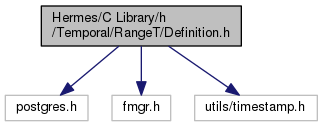|
Hermes
|
|
Hermes
|
#include <postgres.h>#include <fmgr.h>#include <utils/timestamp.h>

Data Structures | |
| struct | RangeT |
Functions | |
| RangeT * | cloneRangeT (const RangeT *range, RangeT *result) |
| PGDLLEXPORT Datum | cloneRangeTV1 (PG_FUNCTION_ARGS) |
| RangeT * | constructorRangeT (const Interval *r, Timestamp c, RangeT *result, char **error) |
| PGDLLEXPORT Datum | constructorRangeTV1 (PG_FUNCTION_ARGS) |
| RangeT * | inRangeT (const char *str, RangeT *result, char **error) |
| PGDLLEXPORT Datum | inRangeTV1 (PG_FUNCTION_ARGS) |
| char * | outRangeT (const RangeT *range) |
| PGDLLEXPORT Datum | outRangeTV1 (PG_FUNCTION_ARGS) |
| PGDLLEXPORT Datum | recvRangeT (PG_FUNCTION_ARGS) |
| bytea * | RangeT2Bytea (const RangeT *range) |
| PGDLLEXPORT Datum | sendRangeT (PG_FUNCTION_ARGS) |
| PGDLLEXPORT Datum | hashRangeT (PG_FUNCTION_ARGS) |
| bool | equalsRangeT (const RangeT *rangeA, const RangeT *rangeB) |
| PGDLLEXPORT Datum | equalsRangeTV1 (PG_FUNCTION_ARGS) |
| PGDLLEXPORT Datum | getRRangeT (PG_FUNCTION_ARGS) |
| PGDLLEXPORT Datum | getCRangeT (PG_FUNCTION_ARGS) |
Referenced by cloneRangeTV1().
| PGDLLEXPORT Datum cloneRangeTV1 | ( | PG_FUNCTION_ARGS | ) |
References RangeT::c, interval2seconds(), and RangeT::r.
Referenced by constructorRangeTV1().

| PGDLLEXPORT Datum constructorRangeTV1 | ( | PG_FUNCTION_ARGS | ) |
References RangeT::c, and RangeT::r.
Referenced by equalsRangeTV1().
| PGDLLEXPORT Datum equalsRangeTV1 | ( | PG_FUNCTION_ARGS | ) |
| PGDLLEXPORT Datum getCRangeT | ( | PG_FUNCTION_ARGS | ) |
| PGDLLEXPORT Datum getRRangeT | ( | PG_FUNCTION_ARGS | ) |
| PGDLLEXPORT Datum hashRangeT | ( | PG_FUNCTION_ARGS | ) |
References asprintfHermes(), RangeT::c, interval2seconds(), and RangeT::r.
Referenced by inRangeTV1().

| PGDLLEXPORT Datum inRangeTV1 | ( | PG_FUNCTION_ARGS | ) |
| char* outRangeT | ( | const RangeT * | range | ) |
References asprintfHermes(), RangeT::c, and RangeT::r.
Referenced by outRangeTV1().

| PGDLLEXPORT Datum outRangeTV1 | ( | PG_FUNCTION_ARGS | ) |
| bytea* RangeT2Bytea | ( | const RangeT * | range | ) |
References RangeT::c, RangeT::r, sendTimeOffsetHermes, and sendTimestampHermes.
Referenced by hashRangeT(), and sendRangeT().
| PGDLLEXPORT Datum recvRangeT | ( | PG_FUNCTION_ARGS | ) |
References RangeT::c, getmsgTimeOffsetHermes, getmsgTimestampHermes, interval2seconds(), and RangeT::r.

| PGDLLEXPORT Datum sendRangeT | ( | PG_FUNCTION_ARGS | ) |